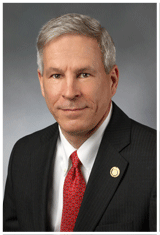JEFFERSON CITY —Physician legislators in the House and Senate are working together to transform Missouri’s system of health care. State Sen. Rob Schaaf, R-St. Joseph, and state Rep. Keith Frederick, R-Rolla, recently announced the introduction of Senate Bill 847 and House Bill 1793, identical bills they say would increase access to providers, insert competition in the market and allow consumers to know the cost of health care in advance by requiring price transparency.
The product of several months of preparation, the legislation provides reforms to the private sector and to Medicaid using market-based solutions to bring down the cost of health care.
"This bill is vastly different than the Affordable Care Act," said Sen. Schaaf, who is a family physician in northwest Missouri. "It is specifically designed to improve access, competition and transparency."
“Drs. Schaaf and Frederick have utilized their extensive experience as health care providers to craft an innovative solution that will transform our system of Medicaid so that it makes good on its promise of delivering quality care to those most in need,” said House Speaker Tim Jones, R-Eureka, who joined Sen. Schaaf and Rep. Frederick at a press conference to unveil their proposal.
The legislation addresses Medicaid reform with a pilot program that uses health savings accounts for qualifying recipients. Sen. Schaaf and Rep. Frederick said the change would allow direct payment to providers and reduce the cost and bureaucracy of the current fee-for-service and managed care systems.
“My pilot program for Medicaid reform empowers recipients with the use of health savings accounts (HSA), while incenting the sensible purchasing of health care services. It would use health information exchanges to put better data into the hands of doctors and allow them to focus on interventions for challenging groups of patients, including premature births, frequent users of the emergency room, and chronic pain patients,” explained Rep. Frederick, who is a practicing orthopedic surgeon.
Rep. Frederick added, “The pilot program would have Medicaid recipients purchase a high deductible plan from their HSA and then give them options for obtaining primary care. These options include the use of the direct primary care model in which the patient pays a set fee per month, typically $70 to $100 each month, and then they can see their physician as often as is necessary. This would happen without co-payments or deductibles and makes same-day and next-day appointments more likely.”
Sen. Schaaf and Rep. Frederick agree Senate Bill 847/House Bill 1793 would increase access to care and overall quality within the Medicaid system. It is designed to increase the number of health care providers and permit a modest increase to the asset test. The information management provisions reduce costs through the reduction of redundant testing and more readily provide information through health information exchanges.
In the private sector marketplace, the bill addresses what Rep. Frederick and Sen. Schaaf say are the three primary components for effective, affordable health care: increasing access, competition and transparency.
"Competition has been proven to lower prices. Market reforms should increase competition and our legislation aims to remove the forces that prevent some providers from entering the marketplace and others from leaving," said Sen. Schaaf. "Market reforms should also remove the roadblocks to competition and increase transparency by letting patients know what things will cost instead of keeping them in the dark as the system does now."
The bill would increase provider access by a combination of efforts including implementing a loan forgiveness program for doctors who agree to practice in underserved areas; allowing physicians who have graduated from medical school, but who have not matched with a residency program, to also practice in underserved areas; and helping keep doctors in Missouri through a compromise offer of meaningful tort reform.
Competition would be increased by reforming the Health Facilities Review Committee, also known as the Certificate of Need Committee (CON). Sen. Schaaf and Rep. Frederick agree the current CON process discourages new hospitals and ambulatory surgical centers from entering the market. Their legislation would require evidence to be taken under oath and prohibit lobbying of committee members. Projects that would create more than five new jobs would be exempt from the CON process.
The bill also addresses other anti-competitive issues. Some hospitals won't let physicians with competing interests on their medical staffs, a practice that reduces competition. The legislation sponsored by Sen. Schaaf and Rep. Frederick, would stop the practice, and would outlaw non-compete clauses between doctors and not-for-profit hospitals. It also would prohibit insurance companies from requiring hospitals to agree not to negotiate lower rates with other insurance companies, known as “most favored nations” clauses.
Unlike other markets, allowing people to shop for health care based on pricing is unnervingly difficult. In other markets, as with Travelocity or Amazon, prices fell significantly when competition was readily available with online shopping. By requiring insurance companies and providers to give cost estimates, requiring the prices of services to be posted, and prohibiting insurers from stopping providers from telling patients the allowed amounts paid for procedures, patients would have the transparency to make the best choices for them. They could choose cost or quality or both, allowing competition to be effective and bringing down prices.
“The cost of health care needs to be much more transparent than exists today,” said Rep. Frederick. “Patients experience great difficulty finding out how much a medical procedure is going to cost, even basic and routine services. I believe Missouri’s patients have a right to ask ‘show me what it will cost’ ahead of the time.”
Added Sen. Schaaf, “The federal government erred by attempting to reform only the health insurance marketplace. What we seek to do for Missouri is transform the health care marketplace as a whole. Increasing access, competition and transparency puts patients back in the driver’s seat and will save our state money.” |



